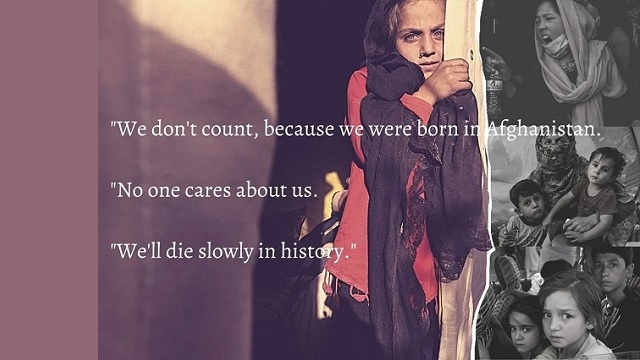Girl Weeps As Taliban Approaches: ‘We Don’t Count Because We Were Born in Afghanistan. No One Cares About Us.’

My latest in PJ Media:
On Friday, the courageous Iranian dissident Masih Alinejad, whom the Islamic Republic recently tried to kidnap in New York and take back to imprisonment, torture, and death in Tehran, posted a video on Twitter of a young Afghan woman. As the tears fall down her face, the woman says:
“We don’t count because we were born in Afghanistan. I cannot help crying. I have to wipe my tears to be able to film this video. No one cares about us. We’ll die slowly in history. Isn’t it funny?”
The woman in the video is not wearing a hijab, which gives the immediate impression that she is not an observant, Sharia-adherent Muslim. Political and military realities that are rapidly changing now may have obscured the fact for her, but this woman is not being abandoned now. She was abandoned years ago, in one of the foremost mistakes of our two-decade-long series of mistakes in Afghanistan.
"We don't count because we're from Afghanistan. We'll die slowly in history"
Tears of a hopeless Afghan girl whose future is getting shattered as the Taliban advance in the country.
My heart breaks for women of Afghanistan. The world has failed them. History will write this. pic.twitter.com/i56trtmQtF
— Masih Alinejad 🏳️ (@AlinejadMasih) August 13, 2021
In our early years in Afghanistan, once the Taliban was toppled, we set about nation-building, initially with an eye toward establishing a Western-style constitutional republic in Afghanistan. But State Department foreign policy experts drastically underestimated the Afghan people’s attachment to Islamic law (Sharia), and disastrously discounted Sharia’s political aspects in the naïve belief, fueled by Islamic apologists in the U.S., that Islam was a religion of peace that was perfectly compatible with Western secular models of governance.
The opposition to Sharia quickly gave way to their desire to be culturally sensitive. The Melbourne Forum on Constitution Building noted in 2018 that “most of the external actors, including the United States, American church groups and the United Nations, initially attempted to marginalise the role of Islam and Sharia in favor of liberal rights and freedoms. However, understanding that Islam and Sharia are entrenched parts of Afghan constitutional culture, foreign advisers such as Yash Ghai and Barnett Rubin, who were directly involved in the drafting process convinced external assistance providers to stand aside and leave Afghans to make choices on these sensitive constitutional questions.”
And so the Afghan Constitution that Afghanistan’s then-President Hamid Karzai formally ratified on January 26, 2004, begins “in the name of Allah, the Most Beneficient, the Most Merciful” and is written in the name of “We the people of Afghanistan, believing firmly in Almighty God, relying on His divine will and adhering to the Holy religion of Islam.” The Constitution notes its appreciation for the “jihad and just resistance of all the peoples of Afghanistan.” It declares that “Afghanistan shall be an Islamic Republic, independent, unitary and indivisible state,” and that “the sacred religion of Islam is the religion of the Islamic Republic of Afghanistan.” The significance of this is spelled out explicitly: “No law shall contravene the tenets and provisions of the holy religion of Islam in Afghanistan.”
There is more. Read the rest here.
RELATED ARTICLES:
Taliban pick up US weaponry left for Afghan military, worth billions of dollars
Taliban leader: ‘I was detained in Guantanamo bay camp for several years’
Afghan president flees, Taliban to declare Islamic Emirate of Afghanistan
Taliban seizes $6,000,000 US Blackhawk helicopters
EDITORS NOTE: This Jihad Watch column is republished with permission. ©All rights reserved.

